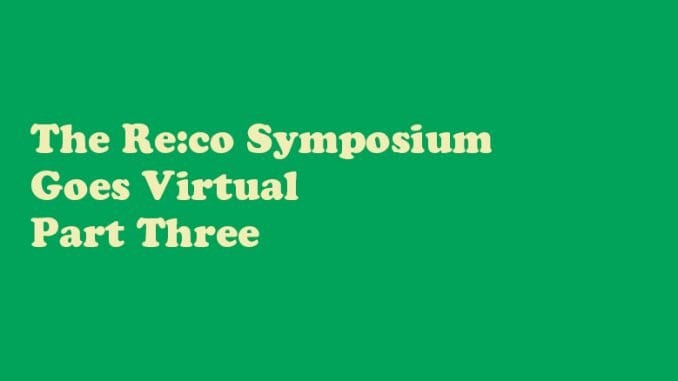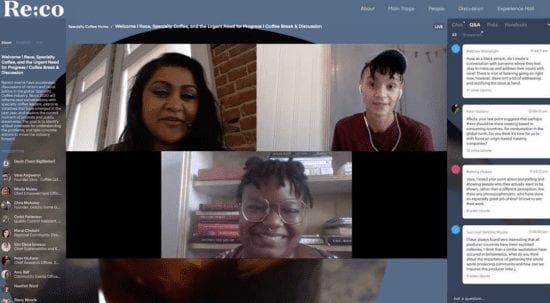
Cydni Patterson and Chris McCauley led a discussion on how to empower and equip BIPOC baristas with the tools to succeed in specialty coffee.
BY CHRISTOPHER FUSE
SPECIAL TO BARISTA MAGAZINE ONLINE
Note from the editor: This past week, we’ve been recapping several of the major panels that took place during the virtual launch of the Re:co Symposium weekend. Today, we conclude with a summary of the singular panel focused on race and specialty coffee.

On July 16, Getchusomegear’s Chris Mcauley and Cydni Patterson of Glitter Cat led a discussion at SCA’s virtual edition of the Re:co Symposium, which centered around marginalized folks and accessibility. Chris and Cydni gave a great overview of the ways in which this group has been an afterthought in coffee shops and the community as whole, along with the change that is needed going forward.
Chris and Cydni both possess many years in the coffee industry ranging from barista to shop manager. They are very much in tune with the coffee culture and the past shortcomings of the industry. They went into detail about their experiences of dealing with café culture and the astonishing lack of support and investment in baristas as a whole, but especially BIPOC baristas. In many coffee shops, being a barista can take on a colonialism type of patriarchy, viewing those closer to the white heteronormative as the standard. This can take place in green bean buying, at cuppings in the café, and even on bar.
Cydni shared a story of how the training process at a new café she worked at lasted only three days. While telling the story, Cydni mentioned how three days was not nearly enough training time to empower baristas to reach their full potential. There was also discussion around how not providing thorough training equips most BIPOC baristas with another layer or fear; this fear takes on the shape of not being comfortable at their craft. The message here is that in most cases, BIPOC baristas will already arrive in the coffee industry with some sort of societal limitation, and adding another limitation from improper training is unjust.
Cydni’s story was able to transition the conversation into how Getchusomegear can help in bridging the gaps in confidence for marginalized baristas. A big focus of Getchusomegear is rooted in equipping baristas with equipment and empowerment. When Chris took on the mission of Getchusomegear, these two areas of opportunity had glaring holes. Most baristas, depending on the shop and business, only make pourovers at work under the watchful eyes of coworkers and customers. Being able to equip and empower a group of people who can branch out and be free of any restraints is critical for growth. Having the opportunity to brew at home is career-changing for many marginalized baristas. Imagine being able to embark on this alchemical trip with the roasted coffee bean and be clear of judgment and limiting thoughts—this is freedom. In gaining this freedom, true growth is now the only option, and this growth is pure, as it is not attached to the input of any voice, other than the barista.
After discussing the mission of Getchusomegear, the conversation moved forward by emphasizing true unity. Chris stated, “We have to all put in a little bit, it does not require us to put our all in.” In talking, Chris challenged cafés to look inward and think of where their power comes, and then push for change. This change could come through training programs and accessibility. Within accessibility, there is the opportunity to reach out to wholesalers that could provide gear at a discounted price, and this could be a deal the café uses to make this a part of on-boarding. Cafés are free to reach out and inquire with Getchusomegear for paid consultation.
Cydni said that cafés should provide more opportunities for education and developing additional skills‚ such as gaining cupping experience. Also, every manager should train employees on how to dial in single-origin espresso and eliminate the experience barrier. Cydni also mentioned how this is a family affair, and all members of a family should be empowered to know the inner workings of the home. On the consumer end, there is an ability to donate gear and even give @getchusomegear a follow on Instagram to stay in the loop, as they have new projects on the horizon.
So, what was the takeaway from this chat?
The time for change is now, and not a moment later. Empowerment and accessibility need to evolve from ideas to action. The days of exclusion must come to an end for this machine to continue to roll. These professionals made it clear that while it will not be easy, it will be worthwhile as the ramifications extend far beyond the visible. Take notes, industry—reach out and have an open dialogue with your staff, and in many cases, your community. The magic that is coffee has an extensive reach, and every life involved should be empowered.

ABOUT THE AUTHOR
Christopher Fuse is a Memphis/Mississippi transplant living in Denver, and an aspiring coffee shop owner. You can usually find him on YouTube watching coffee videos when he’s not outdoors on a walk.

